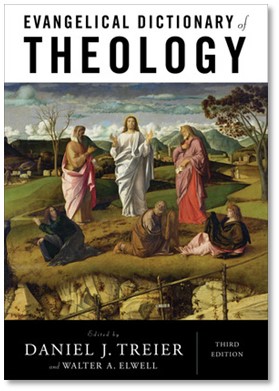 Today, I just happened to be reading Sarah Sumner’s essay on “Gender” in Baker’s Evangelical Dictionary of Theology. Sumner has a couple of paragraphs describing the complementarian and egalitarian spectrums. She says that while all complementarians believe that husbands are the leaders of their homes, there are differences among complementarians about the degree to which women may lead in the church. Although I might quibble with some of her description, I think she has basically described the complementarian spectrum correctly.
Today, I just happened to be reading Sarah Sumner’s essay on “Gender” in Baker’s Evangelical Dictionary of Theology. Sumner has a couple of paragraphs describing the complementarian and egalitarian spectrums. She says that while all complementarians believe that husbands are the leaders of their homes, there are differences among complementarians about the degree to which women may lead in the church. Although I might quibble with some of her description, I think she has basically described the complementarian spectrum correctly.
But then she writes this about the egalitarian spectrum:
“All egalitarians, by contrast, believe that husbands and wives are to relate together in mutual submission rather than a marital hierarchy. Yet not all egalitarians think alike. The most progressive egalitarians believe in gender equality to the point of upholding monogamous homosexual marriage and the ordination of appropriately gifted homosexuals. The most conservative egalitarians hold that Scripture prohibits homosexual unions as well as the ordination of practicing homosexuals. The rift between egalitarians regarding issues of sexual preference and orientation is so great that egalitarian mainline denominations have experienced schism between progressives and conservatives. Thus egalitarians, by label, should not be considered to be supportive of homosexual activities since many egalitarians are conservative” (p. 338, underline mine).
Complementarians have long argued that egalitarian hermeneutics are problematic. Egalitarians tend to introduce novel interpretations of biblical texts that have never occurred to anyone before the 20th century. It may seem that Paul forbids women from teaching and leading men in 1 Timothy 2:12, for example, but it only seems that way. We now know Paul did not mean what the church has always understood these terms to mean. And so a variety of revisionist approaches have emerged to show that Paul actually does allow women to teach and to lead men in 1 Timothy 2:12.
Likewise, those who embrace such revisionist hermeneutics on the gender issue are only a hop-skip-and-a-jump from embracing revisionist readings of biblical texts dealing with homosexuality. Some egalitarians make that jump and do so explicitly because of their previous egalitarian convictions. Others do not. And that is the spectrum that Sumner seems to be describing.
My questions for evangelical egalitarians is this: Has Sumner accurately described the egalitarian spectrum? Is it true that the egalitarian spectrum includes both those who affirm gay marriage and those who do not? Is this a characterization that you would accept? If it is true, do you find it problematic? Why or why not?



